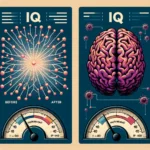Understanding the Impact of Brain Injuries on IQ Scores
The correlation between brain injuries and their effect on an individual’s Intelligence Quotient (IQ) has long been the subject of scientific inquiry and concern. This article delves into the ways in which various types of brain injuries may influence cognitive abilities and potentially alter IQ levels.
Brain Injuries: A Brief Overview
Brain injuries can occur from a multitude of causes like falls, vehicular accidents, sports injuries, or violence. Medically, brain injuries are categorized broadly as traumatic brain injuries (TBI) and acquired brain injuries (ABI). TBI results from external forces, while ABI can occur post-birth due to strokes, tumors, or infections. Such injuries can range from mild concussions to severe damage affecting multiple regions of the brain.
The Link Between Brain Injury and IQ
Intellectual function and IQ scores, which offer a standardized measure of various cognitive abilities, can be significantly impacted following a brain injury. IQ can decline depending on the severity, location, and nature of the injury. Research shows that damage to the frontal lobes – responsible for executive functions like problem-solving, memory, and judgment – can have a pronounced effect on cognitive performance reflected in IQ tests.
Short-term and Long-term Effects
The short-term effects on IQ after a brain injury can include difficulties in concentration, information processing speed, and memory. Tasks that were once easy can become challenging, leading to a potential temporary decline in IQ scores. Following the initial injury and a period of recovery, some cognitive functions can be regained, though this varies based on individual circumstances.
In the long-run, individuals who have suffered from significant brain injuries might experience a permanent alteration in their cognitive faculties. However, the brain’s plasticity allows for some degree of recovery, and rehabilitation therapy can assist in the improvement of cognitive functions and the adaptation to any changes in IQ.
Factors Influencing IQ Changes
Several factors influence how and to what extent a brain injury might affect IQ:
1. **Severity of Injury:** More severe injuries tend to result in greater cognitive deficits.
2. **Age of the Individual:** Younger brains have a higher degree of plasticity. Therefore, children may recover differently from adults.
3. **Location of the Injury:** Certain areas of the brain are more closely associated with cognitive functions tied to IQ.
4. **Type of Injury:** Diffuse injuries (affecting multiple areas) can have a broader impact on cognitive functions as opposed to focal injuries (affecting a specific region).
Cognitive Rehabilitation and Coping Mechanisms
Cognitive rehabilitation therapy is vital for those who have experienced a brain injury. It includes a range of activities and therapies designed to improve cognitive skills and compensate for any deficits. Psychotherapy, support groups, and educational resources can also help individuals and their families understand and adjust to potential changes in cognitive abilities and IQ scores.
In conclusion, brain injuries can have a diverse range of effects on an individual’s IQ, dependent on factors such as severity, age, and the injury’s location. Comprehensive rehabilitation and support can mitigate some of these impacts, but ongoing research is needed to further understand the complexities and aid those affected by brain injuries in leading fulfilling lives.

